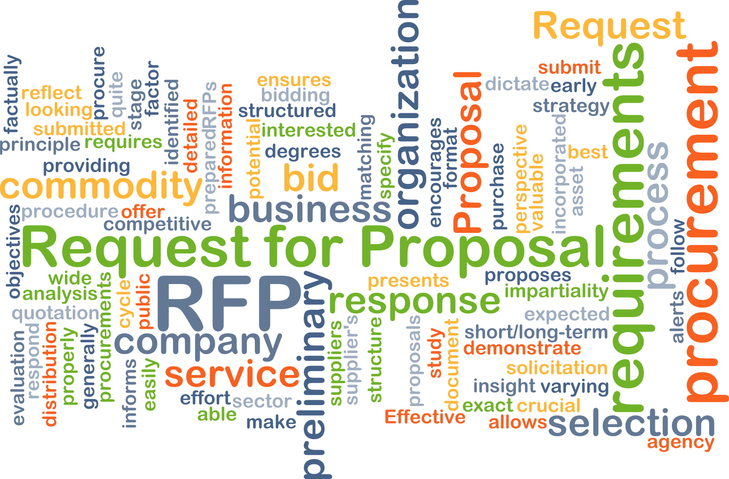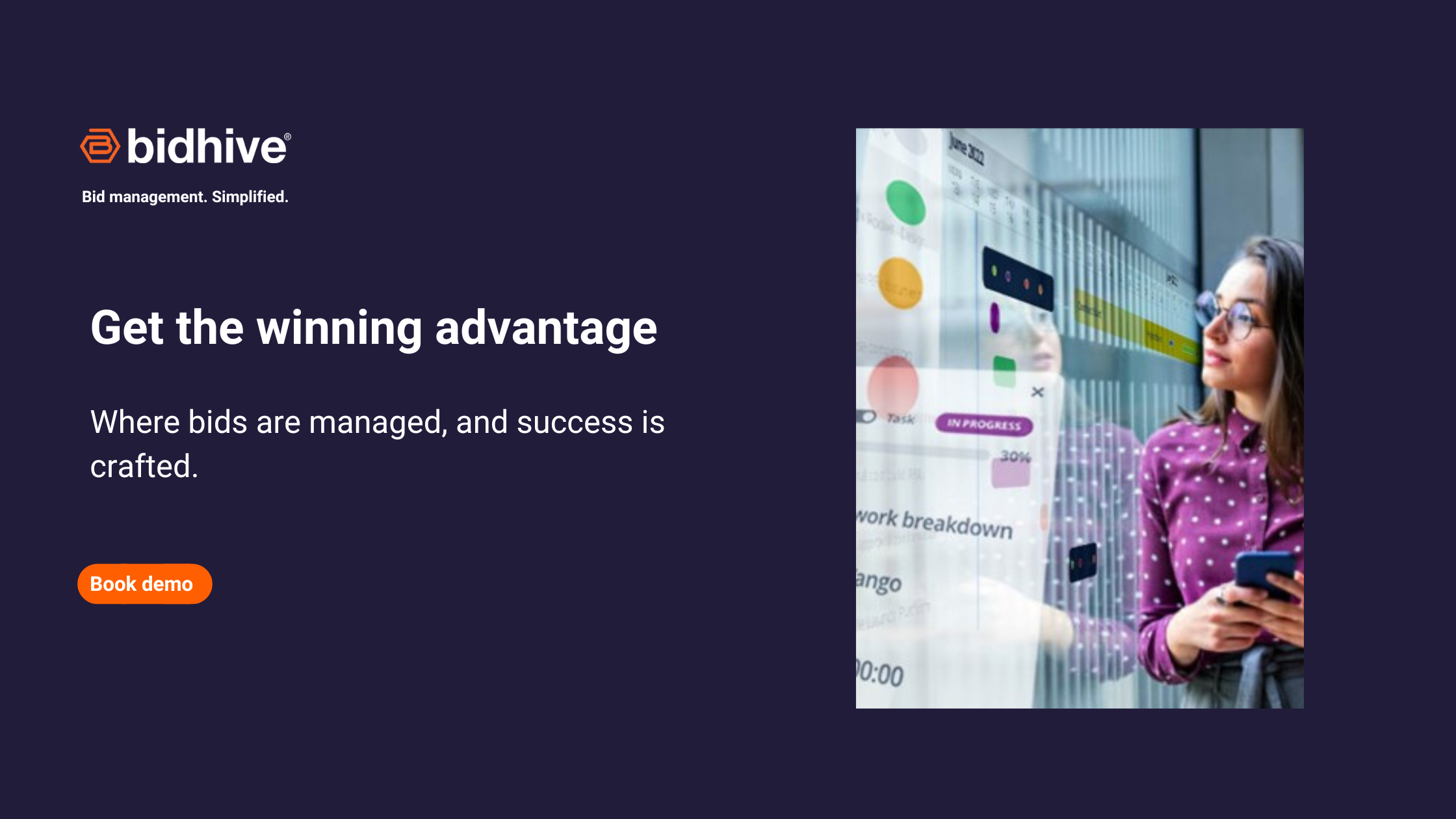In this article we explain the difference between bids, tenders and proposals with a straightforward list of definitions every company needs to know.
Why terminology matters
The first thing to realise is that terms vary from organisation to organisation and from country to country. They also depend to some extent on the background and skill set of the person involved.
What is a tender?
Tendering is an approach to a formal, competitive procurement opportunity to gain significant new or repeat business. It’s a process where buyers (the procurement department) publish a formal notice for goods/services and invites other parties (through the open market, or by limited or closed invitation) to submit a bid to provide those goods or services. This is undertaken ‘at arms’ length’ to provide a level playing field for all bidders. Once a bidder registers for the opportunity, they are issued with identical documentation which includes, but is not limited to, the request for tender, the scope of work (or specifications), response schedule/template, and a draft Conditions of Contract. The tender process is run according to a timeline with a strict deadline. Final submissions – if deemed compliant – run through a formal evaluation process involving a panel who then shortlist. Final applicants are then assessed usually against price and non-price (quality) criteria, with the highest scoring bidder being awarded the contract award.
What is a bid?
Bidding is the formal process of managing a tender opportunity. The term bid or bidding can also relate to the written offer submitted in response to a request or invitation to tender. As mentioned above, the submitted bid is evaluated against a set of criteria described in the request or invitation to tender. It might be a single stage process, or a multi-stage process which begins with an open competition which then progresses to shortlist, presentation and negotiation.
Bidding may involve staff from across the whole breadth of one or more organisations. A Bid Manager will usually oversee the end-to-end process, which may start as early as capture (strategically identifying the opportunity) to post-bid feedback/debrief. Their role may be one of a manager, or they may be hands-on and perform the proposal writing function as well.
The Bid Manager needs to interact with many types of specialists – from technical to legal, finance (or estimating teams), and senior management, and must understand their roles, responsibilities, and what they can and cannot be asked to deliver.
What is a proposal?
A proposal is a written offer from a seller/vendor to a prospective buyer. It is a critical step in the business-to-business (B2B) sales process (sometimes the only step); or in the case of business-to-government (B2G) when a provider has already been successful with their bid to become a preferred supplier, and then moves to a request for quote stage for subsequent engagements. Proposals are client-centric selling documents which usually contain a schedule of fees – these are highly tailored and solutions-oriented to the buyer’s requirements.
What are the key roles in the bid process?
Bid Manager
The Bid Manager takes full ownership of the entire bid program. Sometimes, this may involve identifying and converting significant business opportunities (in some organisations there may even be a dedicated Capture Manager who performs this role), to delivering bid responses – including research, information gathering, and strategic messaging prior to the bid being released. Responsibilities include overseeing best practice processes and procedures, managing multiple resources – sometimes cross-functional, cross-jurisdictional, and even across companies or the supply chain.
As a leadership position, the Bid Manager – who must feel at ease working with executives and the Board – requires strong people management skills, the ability to deal with complex business relationships and competing priorities, and the capability to deliver a strong winning business case to the client in a high-stress environment within tight time frames.
Bid Coordinator
A bid shares many characteristics of a project due to its defined beginning and end point, objectives, roles, responsibilities, milestones, and deliverables. For this reason, some organisations assign a dedicated person to coordinate all the moving parts of the documented bid response.
Proposal Writer
Proposal Writers are usually tasked with pulling together pre-existing information or creating custom content and tailoring it to the client’s needs. Generally, a proposal includes a summary, then identifies the problem or business opportunity, defines the solution and how it will work (the methodology or project plan together with performance criteria), budget/pricing, and organisational details, including names and descriptions of credentials (past performance) and the expertise of the individuals who will be responsible for managing and performing the work.
Other key terms
Business profile or corporate credentials
A business profile or corporate credentials is a written document that presents a snapshot of your company. It essentially serves as a resume for your business.
Capability statement
Similar to a business profile but usually tailored to the audience or the contract requirements. It describes the business’ capabilities and experience, including who you are, what you do, and how you are different from your competitors. Companies often develop many different capability statements tailored to the industry verticals, market sectors or geographic regions in which they operate.
Technical specialist
Also referred to as ‘subject matter experts’, technical specialists are usually industry-specific and are central to developing the client solution. Their focus is on design and functionality rather than the sell. In the IT space, they might be systems programmers or network designers; for major infrastructure, they may be civil engineers.
Technical writer
Technical Writers are professional communicators skilled at translating technical language into plain English instructions for the everyday user of a product or service. The Technical Writer and Bid Manager work closely with Technical Specialists to scope their information requirements to ensure it contributes positively to the Bid.
The role of technology solutions to automate the process
While many technology solutions, such as Request for Proposal software, exist to support the proposal process, few are adept at addressing the complex, multi-stepped nature of tenders and bidding.
The Bidhive bid management solution stands out in a crowded proposal market by providing a fit-for-purpose system that supports your team across all steps and phases of the process. This includes overseeing the bid process from start to finish, encompassing bid strategy, managing Addendum (updates or changes to tender documentation), resource capacity, and client debrief sessions. Our system also facilitates the development and maintenance of non-technical content, the editing of technical schedules, and ensures that submission deadlines are consistently met.
Additionally, with the assistance of AI tools, Bidhive reviews and analyses client documentation, such as scope of works, specifications, and service agreements, and it encourages collaboration with internal teams and subject matter experts to prepare pre-bid capture plans, successful bid responses and performance and status reports. By leveraging such comprehensive and sophisticated technology solutions, we are able to streamline the tendering process, enhance efficiency, and ultimately deliver superior outcomes.


